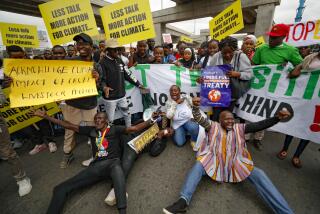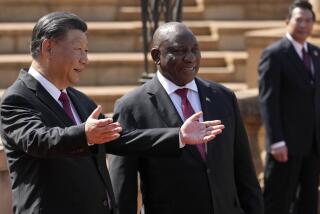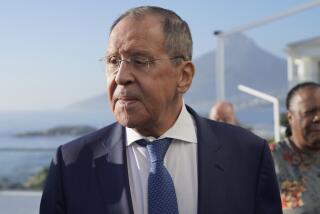5 More Nations Vow to Join Games Boycott in Drive for Sanctions Against S. Africa
- Share via
HARARE, Zimbabwe — Two more Commonwealth countries--Zambia and Zimbabwe--said Friday that they will boycott the Commonwealth Games next week unless British Prime Minister Margaret Thatcher declares her readiness to impose economic sanctions on South Africa to force an end to apartheid.
Their move, taken after a daylong meeting here of leaders of the six black, so-called front-line states around South Africa, is likely to be joined by other Commonwealth countries in Africa, Asia and the Caribbean and thus turn the Edinburgh Games into a largely white affair.
(On Friday night, the two Caribbean nations of Jamaica and Trinidad and Tobago and the Asian nation of Bangladesh announced that they, too, will boycott the games, news agencies reported.)
The action by the five countries brings to 14 the number of Commonwealth nations that have threatened to boycott the games. A press report from New Delhi on Friday indicated that India, the Commonwealth’s most populous nation, is also close to backing the boycott, although there has been no official announcement by the government of Prime Minister Rajiv Gandhi.
Other Commonwealth members were waiting for the announcement from the front-line states before making their own decisions about whether to participate.
The clear intention of the boycott is to increase pressure on Britain, through the 49-nation Commonwealth, to agree to relatively stiff economic sanctions, although these would fall short of the “comprehensive and mandatory” measures the front-line states want.
With the boycott of the games comes a far more serious threat--the withdrawal of such influential countries as Zambia from the Commonwealth and possibly the breakup of the organization.
“We have not really decided to boycott the Games,” President Kenneth D. Kaunda of Zambia, the chairman of the front-line states, said after the meeting. “We have asked Mrs. Thatcher to tell us what she is going to do. The ball is back in her court.”
Willing to Reconsider
Those front-line states threatening to boycott the Games, the leaders said in a conference communique, remain “willing to reconsider if Prime Minister Thatcher makes a categorical statement that the British government will impose economic sanctions against South Africa.”
“Comprehensive and mandatory sanctions remain the only peaceful means to bring about conditions to resolve the escalating conflict in South Africa,” the front-line leaders said.
The delay by Western powers, particularly Britain, in imposing heavier sanctions has “further emboldened the Pretoria regime in its intransigence,” the leaders said in their conference communique.
They called for the immediate lifting of the six-week-old state of emergency in South Africa, the release of Nelson Mandela, jailed leader of the African National Congress, and of other political prisoners, and the legalization of the congress and other outlawed anti-apartheid groups.
These steps would help “create an atmosphere conducive for negotiations between the South African government and representatives of the oppressed majority for the future of the country,” the front-line leaders said.
“If apartheid is not eliminated,” they warned, “southern Africa will be engulfed in a holocaust of tremendous consequences for all inhabitants of the region.”
Until this week, Thatcher had been adamant in her refusal to even consider such sanctions, saying that they would be counterproductive and hurt South Africa’s black majority, rather than help them. But both she and Foreign Secretary Geoffrey Howe said earlier this week that contingency plans are under discussion for some limited British sanctions against South Africa.
Stands by Threat
Kaunda, asked about his earlier threat to quit the Commonwealth if Britain continues its refusal to impose sanctions, said, “Nothing has changed that stand.”
This effectively turns an early August meeting in London between Thatcher and six other Commonwealth leaders, including Kaunda, into a major showdown if Thatcher continues to reject sanctions.
“The Commonwealth is a very important organization--that’s why we are still members--and it would be very sad, very sad indeed, to lose the Commonwealth over this,” Kaunda said.
Tanzania, one of the front-line states, had already announced its decision to boycott the Commonwealth Games, but Botswana adhered to its plans to participate despite intense pressures to join the pullout. The other two front-line states, Angola and Mozambique, are not members of the Commonwealth, which is made up of Britain and most of its former colonies.
The front-line leaders effectively rejected special pleas Friday by Britain, which sent “urgent and important” messages to the summit participants, and by Shridath Ramphal, the Commonwealth secretary general, who is seeking a compromise between Britain and such hard-liners as Zambia, Zimbabwe and Tanzania.
Howe, the British foreign secretary, who is to visit South Africa and probably other countries in the region next week, warned Pretoria a few days ago that if his mission “does not procure tangible and substantial progress, . . . I would regard agreement on some further (sanctions) as likely to be necessary.”
More to Read
Go beyond the scoreboard
Get the latest on L.A.'s teams in the daily Sports Report newsletter.
You may occasionally receive promotional content from the Los Angeles Times.







